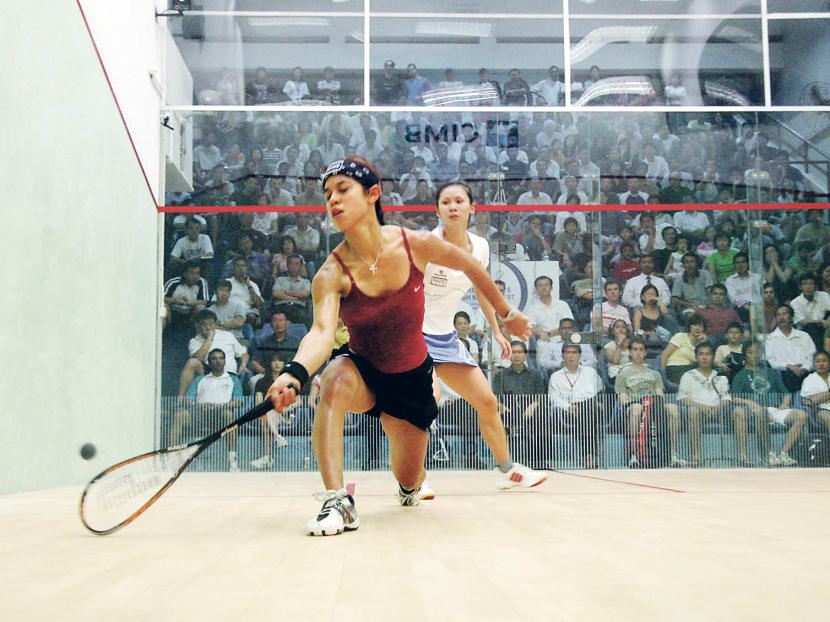Squash ready for a comeback
SINGAPORE — Nine months after taking office as president of the Singapore Squash Rackets Association (SSRA), plastic surgeon Woffles Wu is ready to make a push to revive the flagging fortunes of a sport that saw its best days some three decades ago.

Singapore last saw a top-level tournament here in 2011 with the CIMB Singapore Women’s Squash Masters ending its run after five years. TODAY FILE PHOTO
SINGAPORE — Nine months after taking office as president of the Singapore Squash Rackets Association (SSRA), plastic surgeon Woffles Wu is ready to make a push to revive the flagging fortunes of a sport that saw its best days some three decades ago.
Securing a S$200,000 sponsorship recently from leading local snack chain Old Chang Kee to back a restructured Singapore Open for the next five years, Wu told TODAY in an exclusive interview that the pieces of the jigsaw are starting to fall into place to ensure Singapore can yet again be the region’s leading squash nation, when the likes of Zainal Abidin and Peter Hill were kingpins in the 1980s.
This year’s Singapore Open, to be held from Dec 17 to 22 at the Kallang Squash Centre, will have premier competition for men and women, a Division One event for men, and age-group competitions for boys and girls at Under-13, U-15, U-17 and U-19.
While Wu admits the tournament will not be a big enough draw for the world’s current leading players, he is hopeful that it will attract the likes of five-time World Open champion Sarah Fitz-Gerald of Australia, recent winner of the Over-45 category at the World Masters in Hong Kong, former world No 7 Craig Rowland of Australia (Over-40 champion), and former top Malaysian professional Ong Beng Hee.
“While this is not a full-fledged Professional Squash Association or Women’s Squash Association World Tour event where prize money alone starts at US$50,000 (S$62,030) to US$150,000, what we will have is an Asian Squash Federation ranking event,” said 53-year-old Wu.
“That means any kid who plays will get ranking points, and it will attract players from such nations as Malaysia, Pakistan, Hong Kong, China, even Australia.
“At the very least, we can be assured of a much higher level of opponents for our local players and can look forward to better games. I am not the least worried that our Singapore players will be outclassed, how they fare against better players will set the benchmark to be bettered in the coming years.”
Apart from giving the Singapore Open a boost, Wu is keen to make Singapore a regular destination for players in the masters category, inspired by what he saw at the World Masters Squash Championships held in Hong Kong earlier this month, where Hill and Zainal came third in Over-50 and Over-55 categories respectively and where former leading players such as Brett Martin, Geoffrey Davenport, Natalie Grainger and Melissa Martin were also in action.
“Hong Kong had 780 participants from every conceivable country, full 128-player draws for each category from Over-35 onwards and even seven players for the Over-80 event,” said Wu. “A regular masters tournament here would be perfect for Singapore, seeing as we have a broad base of older players here.
“With Singapore’s reputation as a safe destination, it is perfect for these players who are financially secure, eager to travel and simply want to play — not for prize money, but for the title and pride. Making Singapore a permanent home for a masters tournament will also have good economic spin-offs as well and also broaden the fabric of squash here.”
At the Asian Team Squash Championship last month, Singapore’s men and women teams both finished seventh — the men improving from 10th and the women from ninth at the last edition — which Wu takes as a sign the sport is heading the right direction.
“We were the only nation with no professional players and were able to beat teams that are traditionally stronger than us, such as China, Sri Lanka and Iran,” he said.
“We’re bringing new schools into the squash programme and even managed to persuade Outram Secondary to re-convert their former squash courts back to its original purpose. Things are starting to happen for squash and we are all very excited.”





